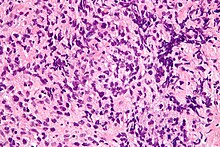| Primary mediastinal large B-cell lymphoma | |
|---|---|
 | |
| Micrograph of a primary mediastinal large B-cell lymphoma. H&E stain. | |
| Specialty | Hematology and oncology |
Primary mediastinal B-cell lymphoma, abbreviated PMBL, is a rare type of lymphoma that forms in the mediastinum (the space in between the lungs) and predominantly affects young adults. [1] [2]
It is a subtype of diffuse large B-cell lymphoma; [3] however, it generally has a significantly better prognosis.
Diagnosis
Diagnosis requires a biopsy, so that the exact type of tissue can be determined by examination under a microscope. PMBL is generally considered a sub-type of diffuse large B-cell lymphoma, although it is also closely related to nodular sclerosing Hodgkin lymphoma (NSHL). [4] Tumors that are even more closely related to NSHL than typical for PMBL are called gray zone lymphoma. [4]
Treatment
Treatment commonly begins with months of multi-drug chemotherapy regimen. Either R-CHOP (rituximab, cyclophosphamide, doxorubicin, vincristine, prednisolone) or DA-EPOCH-R (dose-adjusted etoposide, prednisolone, vincristine, cyclophosphamide, doxorubicin, rituximab) has been typical. [5] Other, more intense, regimens may be more effective. [4]
Radiation therapy may be added, especially if chemotherapy does not seem sufficient on its own. [5] Radiation may cause other health problems later, such as breast cancer, and there is some debate about the best approach to it. [4]
FDG-PET scanning is not as useful for predicting treatment success in PMBL as it is in other lymphomas. [4]
Prognosis
Most people with PMBL are successfully treated and survive for many years. However, if the initial treatment is unsuccessful, or if it returns, the long-term prognosis is worse. [5] Relapses generally appear within 12 to 18 months after the completion of treatment. [4]
Epidemiology
This lymphoma is most commonly seen in women between the age of 20 and 40. [4]
See also
References
- ^ Johnson PW, Davies AJ (2008). "Primary mediastinal B-cell lymphoma". Hematology. American Society of Hematology. Education Program. 2008: 349–58. doi: 10.1182/asheducation-2008.1.349. PMID 19074109.
- ^ Coso D, Rey J, Bouabdallah R (February 2010). "[Primary mediastinal B-cell lymphoma]". Revue de Pneumologie Clinique. 66 (1): 32–5. doi: 10.1016/j.pneumo.2009.12.007. PMID 20207294.
- ^ "Types of Non-Hodgkin Lymphoma". www.cancer.org. Retrieved 2017-09-28.
- ^ a b c d e f g Dunleavy K, Wilson WH (January 2015). "Primary mediastinal B-cell lymphoma and mediastinal gray zone lymphoma: do they require a unique therapeutic approach?". Blood. 125 (1): 33–9. doi: 10.1182/blood-2014-05-575092. PMC 4281829. PMID 25499450.
- ^ a b c Lees C, Keane C, Gandhi MK, Gunawardana J (February 2019). "Biology and therapy of primary mediastinal B-cell lymphoma: current status and future directions". British Journal of Haematology. 185 (1): 25–41. doi: 10.1111/bjh.15778. PMC 6594147. PMID 30740662.
External links
| Primary mediastinal large B-cell lymphoma | |
|---|---|
 | |
| Micrograph of a primary mediastinal large B-cell lymphoma. H&E stain. | |
| Specialty | Hematology and oncology |
Primary mediastinal B-cell lymphoma, abbreviated PMBL, is a rare type of lymphoma that forms in the mediastinum (the space in between the lungs) and predominantly affects young adults. [1] [2]
It is a subtype of diffuse large B-cell lymphoma; [3] however, it generally has a significantly better prognosis.
Diagnosis
Diagnosis requires a biopsy, so that the exact type of tissue can be determined by examination under a microscope. PMBL is generally considered a sub-type of diffuse large B-cell lymphoma, although it is also closely related to nodular sclerosing Hodgkin lymphoma (NSHL). [4] Tumors that are even more closely related to NSHL than typical for PMBL are called gray zone lymphoma. [4]
Treatment
Treatment commonly begins with months of multi-drug chemotherapy regimen. Either R-CHOP (rituximab, cyclophosphamide, doxorubicin, vincristine, prednisolone) or DA-EPOCH-R (dose-adjusted etoposide, prednisolone, vincristine, cyclophosphamide, doxorubicin, rituximab) has been typical. [5] Other, more intense, regimens may be more effective. [4]
Radiation therapy may be added, especially if chemotherapy does not seem sufficient on its own. [5] Radiation may cause other health problems later, such as breast cancer, and there is some debate about the best approach to it. [4]
FDG-PET scanning is not as useful for predicting treatment success in PMBL as it is in other lymphomas. [4]
Prognosis
Most people with PMBL are successfully treated and survive for many years. However, if the initial treatment is unsuccessful, or if it returns, the long-term prognosis is worse. [5] Relapses generally appear within 12 to 18 months after the completion of treatment. [4]
Epidemiology
This lymphoma is most commonly seen in women between the age of 20 and 40. [4]
See also
References
- ^ Johnson PW, Davies AJ (2008). "Primary mediastinal B-cell lymphoma". Hematology. American Society of Hematology. Education Program. 2008: 349–58. doi: 10.1182/asheducation-2008.1.349. PMID 19074109.
- ^ Coso D, Rey J, Bouabdallah R (February 2010). "[Primary mediastinal B-cell lymphoma]". Revue de Pneumologie Clinique. 66 (1): 32–5. doi: 10.1016/j.pneumo.2009.12.007. PMID 20207294.
- ^ "Types of Non-Hodgkin Lymphoma". www.cancer.org. Retrieved 2017-09-28.
- ^ a b c d e f g Dunleavy K, Wilson WH (January 2015). "Primary mediastinal B-cell lymphoma and mediastinal gray zone lymphoma: do they require a unique therapeutic approach?". Blood. 125 (1): 33–9. doi: 10.1182/blood-2014-05-575092. PMC 4281829. PMID 25499450.
- ^ a b c Lees C, Keane C, Gandhi MK, Gunawardana J (February 2019). "Biology and therapy of primary mediastinal B-cell lymphoma: current status and future directions". British Journal of Haematology. 185 (1): 25–41. doi: 10.1111/bjh.15778. PMC 6594147. PMID 30740662.